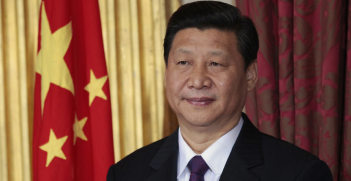Australia’s Business Community – A Perilous Lack of Imagination

The reaction of some in the business community to China’s threats of an economic boycott reflect an acute over-reliance on China. This in itself is symptomatic of the Australian business community’s lack of imagination.
In recent days, China’s ambassador to Australia, Cheng Jingye, threatened that China could launch a boycott of Australia’s tourism, higher education, and agricultural sectors. This threat was made in response to Australian Prime Minister Scott Morrison’s call for an independent inquiry into the origins of the coronavirus.
The reaction of some of Australia’s industry chiefs was as swift as it was predictable. Western Australian media mogul Kerry Stokes – who has extensive business interests in China – used his own newspaper to urge Morrison to “quell” Beijing’s anger, warning of significant costs to the Australian economy. For good measure, Stokes urged Morrison to “respect” wet markets. Stokes’ call won the backing of Western Australian Premier Mark McGowan who was keen to protect his state’s extensive trade with China. Federal Labor MP Anthony Byrne and Senator Kimberley Kitching warned prominent figures from the minerals industry against trying to dictate Australian foreign policy.
Although few outside Beijing would argue against the need for an independent inquiry into coronavirus’ origin, Morrison’s tactics and execution were not beyond reproach. Subsequent calls to the EU, France, and Germany indicated that Morrison had either neglected or not thought it necessary to “ring around” before calling for an independent inquiry. This left Australia extra-exposed to China’s diplomatic barrage – especially after France and Germany argued that now was not the time to be thinking about such an inquiry. Perhaps a better approach would have seen Australia begin early consultations with like-minded governments before raising the issue at the World Health Assembly, which begins on May 18.
In any case, this does not fully justify the reaction of some of Australia’s industry chiefs. In publicly calling for the prime minister to backtrack, these business leaders effectively did the bidding of the Chinese Communist Party (CCP). This matters in a country where the minerals sector is so deeply influential. Nor is this the first time that high-profile members of the Australian business community have publicly undermined government policy on China. A 2018 parliamentary submission by ASPI’s Alex Joske and prominent China critic Clive Hamilton warned that: “Many leading figures in the Australian business community now serve as megaphones for Beijing’s messaging to the Australian government and the wider public, not least in warnings about ‘damaging the relationship’ and the risks of retaliation when statements are made that Beijing does not like.”
More specific examples include the case of billionaire casino-magnate James Packer and mining billionaire Clive Palmer, who both have a history of criticising Australian government policy on China. In 2012, Packer claimed that “China has been a better friend to us than we have been to China and I think if that continues for long periods of time, friendships get damaged”. Palmer once criticised government oversight of Chinese investment in Australia as “racist”, and also warned the government not to raise the case of jailed Rio Tinto executive Stern Hu, lest it damage trade relations. Packer has been noticeably less pro-Beijing ever since Crown Casino staff members were arrested in China, while Palmer sensationally changed his tune on Beijing in 2014, when he complained of “Chinese mongrels” who “shoot their own people”. The catalyst for Clive’s abrupt change of heart was a particularly public and acrimonious business dispute with his former joint-venture partner, Chinese miner Citic.
This is not to say that business advocating for its own self-interest is inherently illegitimate – or that Australia’s China policy has been conducted perfectly. Maybe Australia should follow the Victorian state government’s lead and join the Belt and Road Initiative and cooperate on non-sensitive projects. Maybe it was unnecessary to totally ban Huawei. These matters should be open for legitimate debate. Megaphone diplomacy is also never particularly helpful, especially when aimed at a regime with a notoriously brittle glass jaw. However, the problem is that with some exceptions, Australian business leaders have never provided Canberra any alternative strategy other than to effectively “shut up,” ignore national security and geopolitics, and the let the dollars keep rolling through. More cynical and calculating business leaders may call for “nuance” – also code for effectively avoiding doing anything that Beijing doesn’t like. Inevitably, there will be times when Australia’s national interest will dictate that it does and says thing which rile Beijing. Businesses should prepare for this.
A second point is that elements of the Australian business community seem to have an incredibly narrow conception of what their own self-interest is. Instead of employing the basic risk-management strategy of diversifying their customers, firms find themselves almost entirely reliant on the Chinese market. This is a highly problematic strategy, prone to disruptions from economic downturns, China’s opaque legal system, commercial disputes, political tensions, and of course, global pandemics. As both Packer and Palmer found out, effusive praise of the CCP was not enough to protect their own Chinese business interests.
This over-reliance is replicated in the broader Australian economy, the most China-reliant of any in the developed world with Beijing buying approximately one-third of Australian exports. The over-reliance on China is also symptomatic of a broader lack of imagination amongst parts of the Australian business community. Service exports are concentrated in tourism and education, which of course China dominates. While a growth in services trade with India is a welcome development, in 2018, Australia’s services trade with New Zealand was far higher than trade with either Malaysia, South Korea, Vietnam, Indonesia, or Taiwan. Australian business is deeply comfortable with the familiar and the US, UK, New Zealand, Canada, and the Cayman Islands constitute five of the seven of the top-destinations for Australian foreign direct investment. Investment in the more challenging but arguably higher-potential Indonesian, Indian, and Vietnamese markets is comparatively negligible.
Donald Horne – author of the iconic critique, The Lucky Country – once famously described the modus operandi of Australian business as it operated in the 1960s: “To many Australian businessmen the way to make money has been to grab some ideas from overseas, rush them into operation, however inefficiently, and then rely on the Tariff Board for protection.” Australia has changed since this time and has some of the lowest tariffs in the world – and strident intellectual property laws to boot. Horne’s description, adapted to today’s realities, might describe a business community that develops a product – let’s say a natural resource – which is sold predominantly to the Chinese market. The next step is to plead with Canberra not to upset the authoritarian and thin-skinned government in Beijing – who also happens to be flagrantly interfering in Australia’s domestic affairs. Even less imaginative businessman may just prefer to park their money somewhere in the Anglosphere.
There are of course exceptions to the rule. There are examples of Australian businesses who could export everything they make to China but chose not to, so as to maintain a diversified customer base. In light of Ambassador Jingye’s threat of a student boycott, Deakin University’s more diversified international student cohort – where Chinese students make up 28 percent of population, compared to the Australian universities’ average of 40 percent – appears particularly prescient.
Australia is always going to have a degree of reliance on China. The question is how severe this dependency should be. The exigencies of geopolitics and any level of concern for basic risk management would dictate that a concerted effort is undertaken to at least try and substantially minimise this dependency. Whether Australian business is up to the task remains an open question.
Henry Storey currently works as a political risk analyst. He holds a Master of International Relations degree from Melbourne University and is also an editor at Foreign Brief.
This article is published under a Creative Commons Licence and may be republished with attribution.





